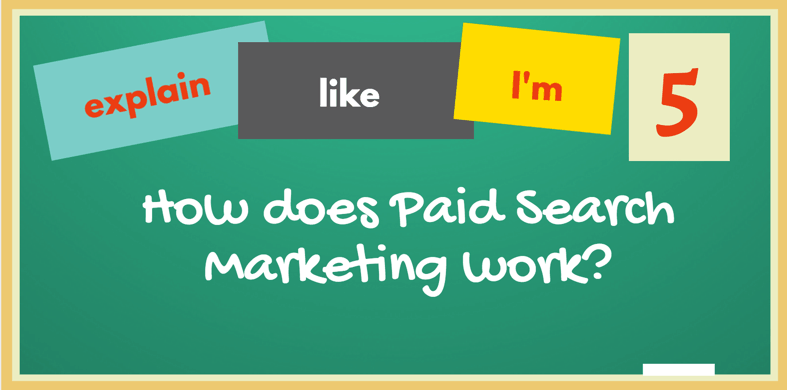ELI5: How does Paid Search Marketing work?

I was recently asked for a good, basic ELI5-style answer to the question “How does paid search marketing work?” If you’re not familiar, ELI5 (“Explain Like I’m Five”) is a popular subreddit where people request responses that are “friendly, simplified and layman-accessible explanations – not responses aimed at literal five-year-olds.”
Here’s my attempt at a clear, comprehensive answer to that question:
The key players in paid search marketing
Paid search marketing usually refers to a pay-per-click model where advertisers pay only when people click their ad and visit their website. Google is the 800 lb gorilla in the space; through their ad platform called AdWords, advertisers create text ads that appear on the search engine results pages.
There are many other players (Bing, Yahoo, Amazon, etc), and many types of ads beyond text (banners, video, sponsored email, etc).
How to be successful, and why reaching the right audience matters
Usually, advertisers have something specific they want you to do on the site (like make a purchase, or submit your contact info), but since they are charged by the click, they pay whether or not you buy, sign up, or just exit the site immediately.
Advertisers don’t want to waste their money paying for clicks where people aren’t likely to take action, so they set up targeting to reach a specific audience that’s more likely to be interested in their offer.
Targeting can include: only showing the ad to certain locations, certain languages, people who have visited certain websites, and most commonly – people who typed certain keywords into Google.
How advertisers decide what to spend
Advertisers can track just about everything that happens in paid search marketing – how often their ads were seen, how often they were clicked, how many leads and sales came from those visits, etc. This lets them know how valuable the clicks are, and helps them decide how much they’re willing to pay for clicks.
Using a tool like AdWords, advertisers set their “bids” for keywords. Most engines won’t charge advertisers more than their bid, and may charge significantly less.
How engines decide what to charge
Engines like Google use an auction and their own algorithm in real time to decide which ads to serve, and in which order.
They try to determine not only who’s willing to bid the most, but also whose ad is most likely to get clicked.
Remember, Google makes no money if the ad is not clicked, so they want to serve the best ads. 1st position goes to the best ad that’s likely to get clicked, not just the highest bid. The top ad may actually cost than other ads if the click-through-rate is strong.
Other considerations (and how not to get ripped off!)
Paid search marketing is often synonymous with PPC (pay per click). But advertisers can also buy ads based on how many people view the ad (CPM), or how many people take action (CPA).
It’s important for advertisers to know and stay focused on their goals (the things that have real business value). Some PPC agencies will sell paid search marketing services as packages (clients can buy 40 million impressions at a set rate). Advertisers who buy these packages are unlikely to be reaching the right audience; lots of cheaper impressions can be coming from random apps, foreign language sites, and other bad traffic sources.
Smart advertisers expect their paid search investment to be accountable. They focus on their business growth, and refine their marketing to maximize efforts that are most successful.
Ready to get started? Learn about AdWords & Paid Search Coaching with Amy here.
If you feel the same way, join us here. You'll get our latest content and podcast episodes that will teach, inspire, and motivate you to achieve new levels of success with Paid Search.Here at Paid Search Magic, we get pretty excited about all things related to getting better RESULTS in Paid Search Marketing.

